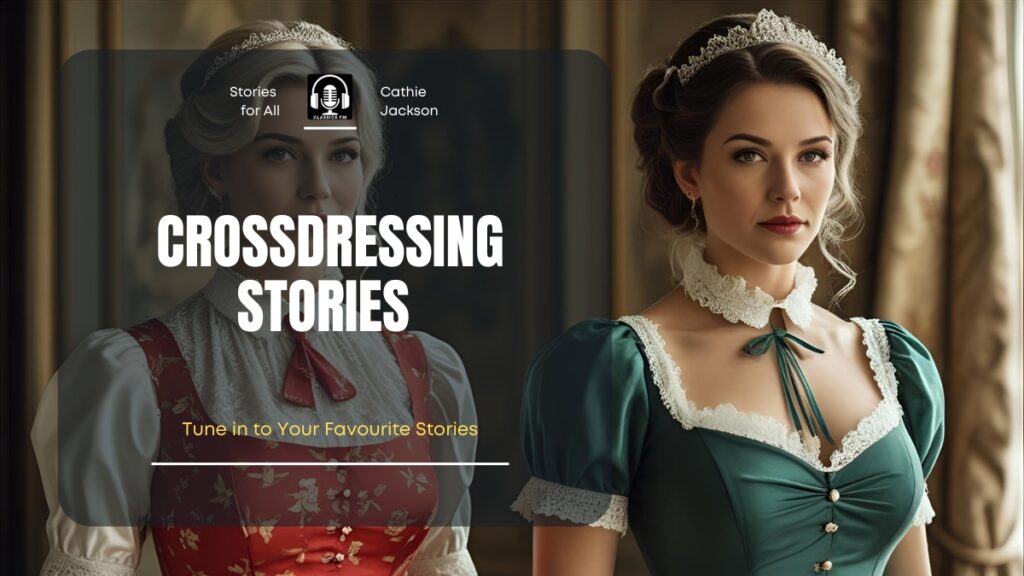Let me start with a confession. I once tried to dive headfirst into celebrating Native American Day by creating my own Short native american day stories with the full-on cultural enthusiasm of a reality TV contestant.
I thought, “Hey, this will be fun. Maybe even inspiring!” Fast forward two hours, and I was sitting on my couch, red-faced, eating crow like it was dessert.
Yes. Crow. Not even metaphorically, okay maybe metaphorically, but it felt like I should have been awarded a medal for my epic fail.
The Moment I Knew I Was Toast
It all started with the plan. I wanted to immerse myself in the beauty of Native American culture. I envisioned myself reading stories, reflecting on history, maybe even trying a little bit of traditional art. I was going to be, in my mind, culturally sensitive, thoughtful, maybe even enlightened.
Spoiler alert. I wasn’t.
I sat down with my laptop, ready to dive into what I thought would be “Short Native American Day Stories.” I imagined short, punchy narratives that celebrated courage, community, and connection with nature. Sounds innocent enough, right?
Wrong. Because instead of simple, accessible stories, I ended up in the deep end of cultural research. Suddenly I was trying to decipher complex tribal histories, ceremonial practices, and nuanced storytelling traditions that honestly went way over my head.
I had no idea what I was doing.
I mean, how was I supposed to summarize centuries of oral tradition in a single afternoon? And yet, there I was, confidently typing out half-baked “mini-stories” that felt like someone took a history textbook, threw it into a blender, and hoped it came out as Instagram content.
Epic fail.
Short Native American Day Stories for Kids
Ever wondered what lessons a few minutes of storytelling could teach you about courage, community, and connection to nature? Dive into Short native american day stories and discover wisdom that lasts a lifetime.
1. The Missing Drum
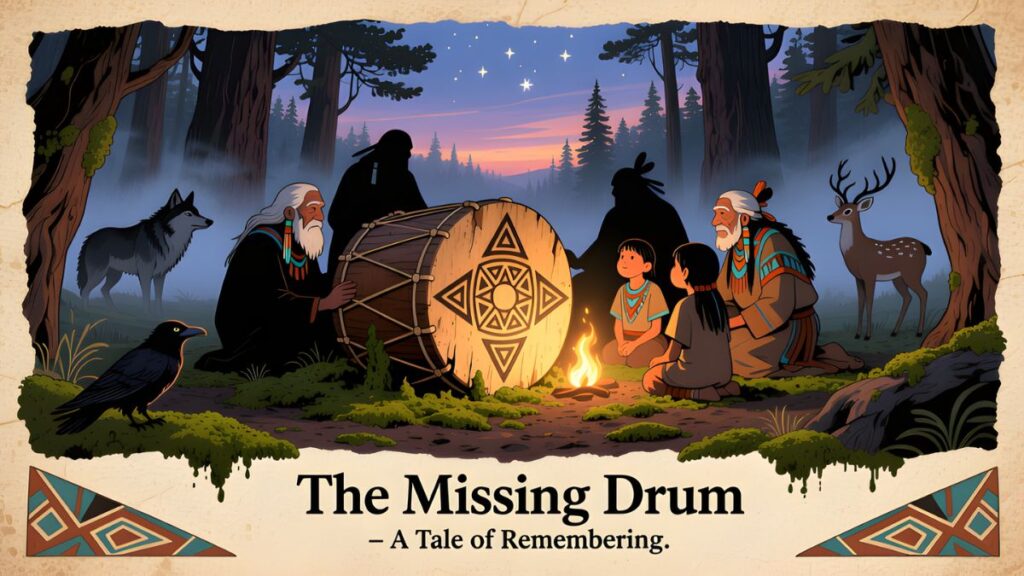
Kiona loved the drum.
It was not just any drum.
It was sacred.
It had been in the village for generations.
The drum carried songs.
It carried stories.
It carried the heartbeat of the people.
Every family in the village knew it.
Every child respected it.
Every elder had a memory tied to it.
Kiona had grown up hearing its rhythm.
The drum was her connection.
It made her feel part of something larger.
Part of the past.
Part of the present.
Part of the future.
On the morning of the festival, Kiona rushed to the drum hut.
She wanted to see it.
She wanted to touch it.
She wanted to feel its pulse.
But the drum was gone.
The hut was empty.
Kiona froze.
Her heart skipped a beat.
No one else was near.
She ran to the village square.
Elders were gathering.
Villagers were talking.
All voices sounded anxious.
Kiona approached the chief.
“Where is it?” she asked.
The chief shook his head.
“Missing,” he said.
Kiona’s stomach sank.
The festival could not start without the drum.
Songs could not be sung.
Stories could not be shared.
The heartbeat of the village was silent.
She clenched her fists.
Her determination rose.
“I will find it,” she said.
The elders looked at her.
Some frowned.
Some smiled.
They knew Kiona.
She had courage.
She had persistence.
She had a sharp mind.
“You will need supplies,” the chief said.
Kiona nodded.
She ran home.
She packed berries.
She packed water.
She packed a small blanket.
She packed her courage.
She left the village.
The forest waited.
Tall trees.
Shadowed paths.
Rustling leaves.
She stepped carefully.
Birds watched her silently.
A soft wind moved through the branches.
It seemed to whisper.
Kiona called out.
“Drum! Where are you?”
The wind answered.
Nothing else.
She walked deeper.
Twigs snapped underfoot.
Branches scratched her arms.
Her shoes were muddy.
Her hands were wet from dew.
She paused.
She listened.
The forest was alive.
Every sound mattered.
Every shadow mattered.
She wondered if the drum could hear her.
She imagined the drum calling back.
She shook her head.
She must focus.
Hours passed.
Her feet ached.
Her stomach growled.
The sun moved across the sky.
Clouds drifted slowly.
The river appeared ahead.
It sparkled.
It laughed.
It whispered secrets.
Kiona knelt.
She drank.
She rested.
Her eyes scanned the trees.
Something caught her attention.
A small clearing.
Moss covered the ground.
And there it was.
The drum.
It rested beside the stream.
No one had touched it.
Animals surrounded it.
A deer stood still.
A fox watched carefully.
Birds perched above.
The drum seemed to hum.
Kiona approached slowly.
She lowered herself to the ground.
She reached out.
Her fingers touched the wood.
It felt warm.
It felt alive.
She lifted it carefully.
It was heavier than she imagined.
Her arms shook.
But she did not falter.
She stood.
The animals did not move.
It was as if they were guarding her.
Kiona smiled.
She whispered thanks.
She started back toward the village.
The journey was harder than before.
The drum added weight.
Branches scratched her skin.
Rocks tripped her feet.
Her feet were tired.
Her arms ached.
She stumbled.
She fell.
The drum stayed safe.
She breathed deeply.
She kept moving.
The sun was lower now.
Shadows grew long.
The forest looked different.
The path seemed endless.
She imagined the villagers waiting.
She imagined their faces.
She imagined their songs.
Her heart pushed her forward.
The stream crossed her path.
She jumped from stone to stone.
She almost slipped.
But she caught herself.
Her fingers were numb.
Her legs were sore.
But she smiled.
She knew she was close.
The forest began to thin.
She saw the first huts.
The village!
Her pace quickened.
The animals watched her leave.
She felt their eyes.
She felt their blessing.
She ran the last few steps.
Villagers saw her.
They gasped.
They cheered.
Kiona lifted the drum high.
The elders nodded.
The chief smiled.
“You have done well,” he said.
Kiona lowered the drum.
It felt lighter now.
It was safe.
The festival began.
Music rose.
Songs rang out.
Drums beat.
Children danced.
Adults smiled.
Kiona watched.
She felt proud.
She felt brave.
She realized something important.
Bravery is not loud.
Bravery is not always seen.
Bravery is steady.
Bravery is patient.
She had carried the drum.
She had carried the story.
She had carried the heartbeat.
The sun set.
The festival continued into the night.
Kiona lay under the stars.
The drum rested beside her.
The river whispered.
The wind sang softly.
She closed her eyes.
She had learned.
Patience.
Courage.
Respect.
She dreamed of the animals.
She dreamed of the forest.
She dreamed of the village.
The next morning came.
The drum still sang.
The village was alive.
Stories were shared.
Songs were sung.
The heartbeat continued.
Kiona had done her part.
She smiled.
She was ready for the next adventure.
2. The Moonlit Trail
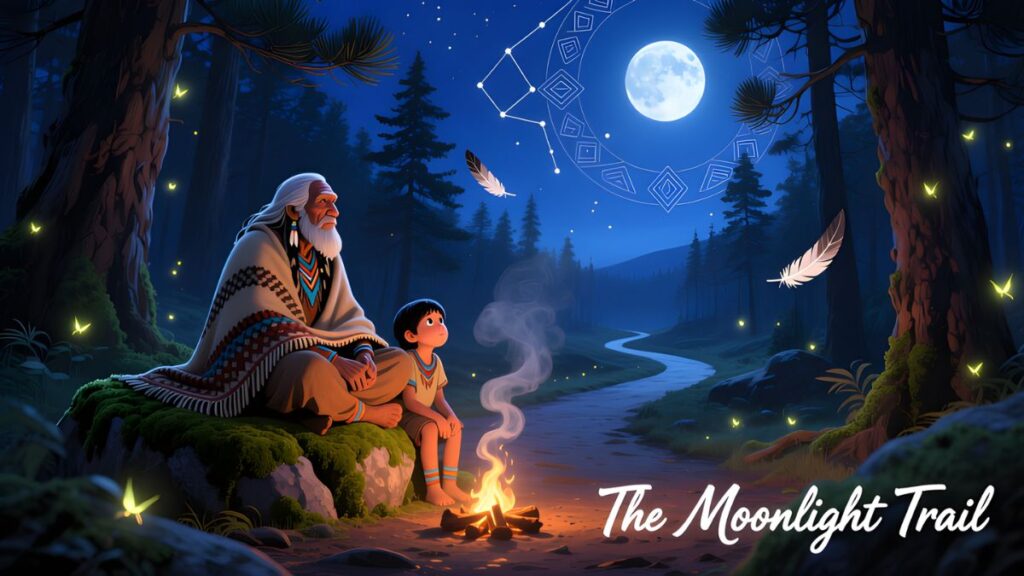
Aylen was afraid of the dark.
Always had been.
Shadows made him uneasy.
The forest felt endless.
Even the wind sounded strange.
At night, every rustle became a threat.
Every shadow hid something unknown.
His mother worried.
His father shook his head.
But Aylen could not help it.
The other children laughed at him.
“Don’t be scared!” they said.
Aylen wished he could be brave.
He wanted to join their games.
He wanted to explore.
He wanted to feel the forest’s secrets.
But fear stayed with him.
It followed him everywhere.
One night, the moon rose.
Bright. Full. Silver.
It lit the forest like daylight.
Aylen stood at the edge of the village.
He stared at the trees.
They swayed gently.
Leaves shimmered in the moonlight.
A soft breeze touched his face.
Something called to him.
“Maybe tonight,” he whispered.
He took a small step.
Then another.
The ground was cool beneath his feet.
Shadows still danced.
He felt nervous.
But the moon shone brighter.
It formed a silver trail.
The trail led into the forest.
Aylen’s heart beat fast.
He remembered stories from his grandmother.
Stories of ancestors who walked at night.
Stories of hidden paths.
Stories of courage.
He imagined their footsteps.
He imagined their voices.
He felt a little braver.
He followed the trail.
Twigs snapped softly underfoot.
Leaves crunched.
An owl hooted nearby.
A fox darted between trees.
Aylen paused.
His breath came quickly.
But he did not turn back.
The trail twisted and curved.
Sometimes it seemed to vanish.
Sometimes it seemed endless.
But the moon guided him.
Silver light fell on moss and stones.
It highlighted shapes in the darkness.
Aylen noticed patterns in the trees.
He remembered his grandmother’s words.
“Trust the moon,” she had said.
“Trust the night. It shows you what your eyes cannot see.”
He repeated it quietly.
“Trust the moon. Trust the night.”
A breeze moved through the branches.
It felt like the forest was alive.
The wind whispered.
“Keep going.”
Aylen stepped forward.
His legs ached.
His feet were tired.
But he pressed on.
A soft rustling came from above.
He looked up.
Stars twinkled.
A constellation looked familiar.
It mirrored the one his grandmother had drawn in the dirt.
A smile crept onto his face.
He felt connected.
The trail bent sharply.
A small stream appeared.
Water sparkled under the moon.
Aylen knelt.
He drank carefully.
He touched the cold water.
It was refreshing.
The sound of the stream calmed him.
He sat on a stone for a moment.
He breathed deeply.
The fear had not gone.
But it had softened.
The moon seemed to shine closer.
As he stood, he noticed something ahead.
A large tree.
Its trunk was wide and ancient.
Its roots twisted into the earth like giant fingers.
Symbols were carved into the bark.
Some faded. Some still sharp.
Aylen’s eyes widened.
This was the tree from the stories.
The one where ancestors left messages.
He approached slowly.
He traced the symbols with his fingers.
They were grooves from generations.
Messages from those who walked before him.
He felt their presence.
He felt their courage.
He realized something.
Fear had led him here.
Without fear, he might never have ventured.
Without trust, he might have stayed home.
Without courage, he might never have discovered this place.
Aylen sat beneath the tree.
He listened.
The wind sang through the branches.
The moonlight kissed the bark.
He imagined voices.
Ancestors telling stories.
He whispered a promise.
“I will remember you. I will honor you.”
A small owl landed on a branch.
It blinked at him.
Aylen felt a smile.
He stayed until the moon reached its peak.
He felt the rhythm of the night.
He felt connected.
The forest no longer seemed frightening.
It seemed alive.
He began the journey home.
The trail felt easier.
The moon guided him again.
Stars watched silently.
He moved carefully but confidently.
He thought of his grandmother.
He thought of the ancestors.
He thought of the courage he had found.
By the time he reached the village, dawn was near.
The sky was painted in pinks and golds.
He paused at the edge.
He felt proud.
He had faced fear.
He had trusted the unknown.
He had discovered something greater.
Aylen ran home.
He told his family.
He told the elders.
They listened, amazed.
He had walked where no child had dared.
He had found the ancient tree.
And he had returned.
The village celebrated his courage.
Stories of his journey spread.
Aylen understood the lesson.
Fear is not always the enemy.
Sometimes it is the guide.
Sometimes it shows what lies beyond comfort.
He would return to the forest.
He would follow the moonlit trail again.
He would carry its lessons forever.
3. The Talking Stones
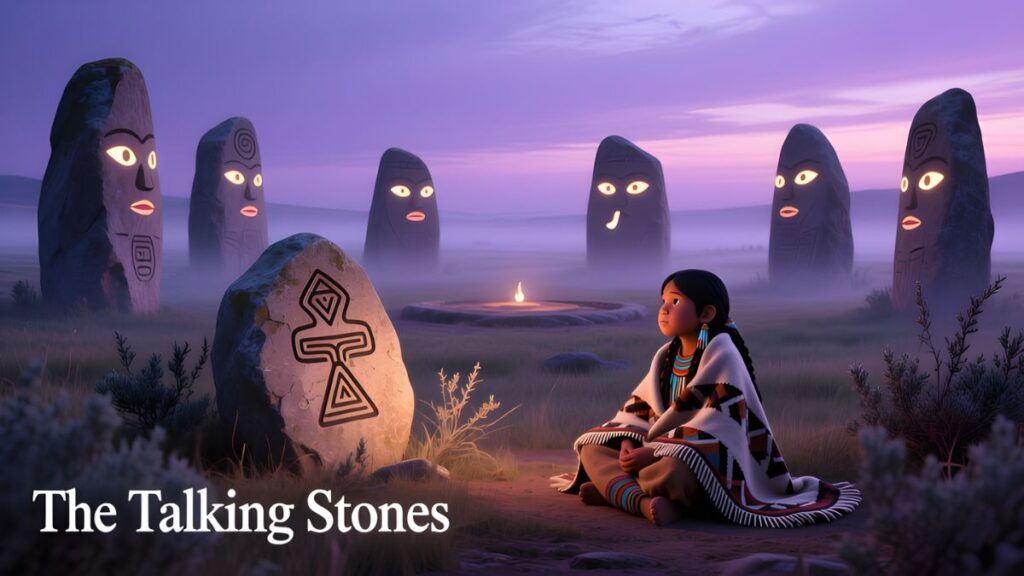
Lila loved the edge of the cliff.
It overlooked the valley.
The wind always blew there.
It carried scents of pine.
It carried the songs of birds.
It carried whispers from the past.
The stones were scattered along the cliff.
Flat. Smooth. Weathered.
Some were small.
Some were large.
Each one had been placed carefully.
Generations ago.
Elders said the stones held memories.
Stories of people who had walked the land before.
Lila was curious.
She wanted to hear them.
She wanted to know.
Other children played in the village.
They laughed and ran.
They ignored the stones.
Lila did not.
She approached them.
Her fingers brushed the cool surfaces.
She imagined the hands that had touched them before.
She knelt.
She whispered.
“I wish I could know your stories.”
The wind shifted.
It rustled the grass.
It carried soft echoes.
Lila froze.
Had she imagined it?
She listened carefully.
A faint hum seemed to rise from the stones.
Her heart beat faster.
She leaned closer.
A small bird landed nearby.
It tilted its head at her.
Lila smiled.
“Do you hear it too?” she whispered.
The stones seemed to hum again.
Softly.
Like voices beneath the surface.
Her imagination raced.
Could the stones really talk?
The elders had always said they did.
Stories carved in memory.
Stories passed by touch and thought.
Lila wanted to understand them.
She stayed there for hours.
The sun moved across the sky.
Shadows lengthened.
Birds flew home.
The wind whispered through the trees.
Lila closed her eyes.
She focused on the hum.
She remembered her grandmother’s stories.
Of ancestors who left lessons in subtle ways.
Of objects that carried wisdom silently.
She whispered again.
“Please, tell me your story.”
A small wind blew.
It swirled around her.
She felt it lift her hair.
The hum grew stronger.
She saw shapes in the shadows.
Images flickered.
A hunter.
A child.
A family sitting near a fire.
She blinked.
Were these memories?
Were they wishes?
She did not know.
She only listened.
She placed her hand on a flat stone.
It felt warm.
She imagined the people who had touched it.
The voices grew louder in her mind.
Soft. Gentle. Patient.
She smiled.
The stones were teaching her.
Teaching her about patience.
Teaching her about listening.
Teaching her about respect.
Lila returned home slowly.
The village looked familiar.
Different somehow.
She felt the weight of the stories she carried.
She remembered each stone.
Its hum. Its shape. Its history.
That night, she dreamed of the cliff.
She dreamed of the wind.
She dreamed of ancestors speaking softly.
She woke at dawn.
The memory of the stones lingered.
She wanted to return.
She wanted to learn more.
The day passed slowly.
Everywhere she went, she felt the presence of the cliff.
She touched stones in the village square.
She imagined their stories.
She listened to the trees.
She listened to the river.
Everything seemed connected.
The cliff, the wind, the stones—they were teachers.
Her curiosity grew.
She returned to the edge that evening.
The sun dipped low.
The sky turned orange and pink.
The stones glowed in the fading light.
She knelt again.
She whispered her questions.
The hum returned.
Stronger this time.
She felt images in her mind.
A festival.
A hunt.
A family celebrating a birth.
A ceremony by firelight.
She realized the stones remembered more than she could see.
The valley below shimmered in twilight.
Shadows danced.
Birds flew home.
Wind carried the faint scent of pine.
She understood something important.
Stories were everywhere.
Even in silent objects.
Even in the wind.
Even in rocks.
Lila stayed until nightfall.
The stars appeared.
The moon rose slowly.
Its light fell on the stones.
They seemed to shine softly.
She closed her eyes.
She felt connected to everyone who had been there before.
She whispered a promise.
“I will remember. I will honor your stories.”
A small owl landed nearby.
It blinked.
She smiled.
She stayed until the moon was high.
Then she returned home carefully.
She walked slowly.
The village was quiet.
Only a few lights glimmered in huts.
She entered her home.
Her mother waited.
Her mother smiled.
“You have been at the cliff again,” she said softly.
“Yes,” Lila replied.
“I listened. I learned. I remembered.”
Her mother nodded.
“You are learning well,” she said.
Lila felt proud.
She knew she had begun a journey.
One that would last her whole life.
The stones would continue to teach her.
The wind would continue to carry whispers.
The cliff would always be there.
Waiting.
Silent.
Patient.
Guiding those who were willing to listen.
4. The Feather and the Fox
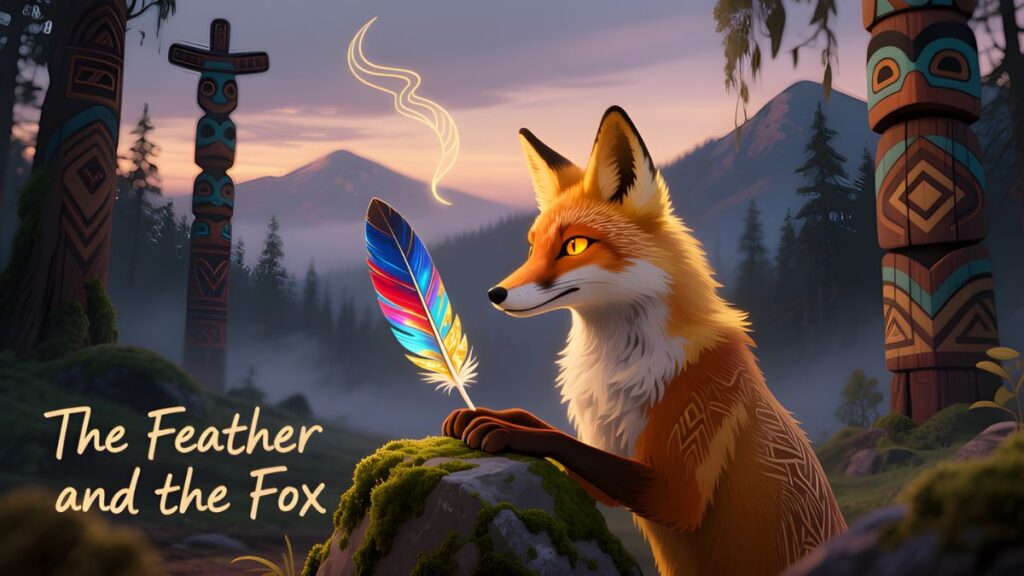
Niko loved the forest.
He knew every path.
Every tree.
Every stone.
His father had taught him.
His grandfather before that.
They were hunters.
They were trackers.
They were teachers.
Niko wanted to learn everything.
He wanted to be brave.
He wanted to be wise.
One morning, snow covered the village.
White and soft.
The forest looked different.
Quiet.
Peaceful.
Dangerous.
Niko bundled up.
His father handed him a small bow.
“Stay close,” his father said.
“Watch. Listen. Learn.”
Niko nodded.
He stepped into the forest.
His boots crunched on fresh snow.
The air was cold.
Sharp.
Clear.
He breathed deeply.
He smelled pine.
He smelled frost.
He smelled life.
Birds chirped above.
Squirrels darted among trees.
Niko moved carefully.
Eyes alert.
Ears listening.
Every sound mattered.
Every movement counted.
Hours passed.
Snow fell gently.
The forest seemed silent.
But Niko knew better.
He watched the ground.
He watched the branches.
He watched the tracks.
A rabbit had passed by.
Fresh footprints.
Niko followed them quietly.
Suddenly, something caught his eye.
Bright. Red. Blue.
A feather.
It lay in the snow.
Vivid against white.
Niko knelt.
He touched it gently.
It was soft.
It shimmered in the sunlight.
He wondered where it came from.
Bird? Magic? Something else?
He held it carefully.
He decided to keep it.
It felt special.
It felt important.
He continued hunting.
But he could not stop thinking about the feather.
Then he saw movement.
A small fox appeared.
Red fur. White tip on its tail.
It stepped carefully on the snow.
Its nose twitched.
It stopped.
It looked directly at Niko.
Its amber eyes were sharp.
Niko froze.
The fox sniffed the air.
Then it sniffed the feather in Niko’s hand.
It circled him slowly.
Niko’s heart beat fast.
He did not move.
He did not breathe loudly.
The fox sniffed again.
Then it vanished.
Into the trees.
Niko blinked.
He stared at the spot where it had been.
It was gone.
But he felt something had changed.
The feather felt more alive.
It was no longer just a feather.
It was a gift.
A message.
Niko continued his journey.
He thought of his father’s teachings.
Patience. Respect. Gratitude.
He realized the feather reminded him of these lessons.
It was small.
But powerful.
The forest whispered around him.
Wind moved the branches.
Snow shimmered in the sunlight.
Every detail seemed sharper.
Every sound mattered.
Niko moved carefully.
He watched the birds.
He watched the tracks.
He noticed patterns he had never seen.
The feather in his pocket seemed to guide him.
Hours passed.
The sun began to drop.
Shadows stretched long.
Niko stopped.
He looked around.
The forest seemed different.
Alive in ways he had never noticed before.
He knelt by a frozen stream.
He touched the ice.
He listened to the water flowing beneath.
The feather seemed to hum softly in his pocket.
Niko smiled.
He thought of the fox.
Its curiosity.
Its intelligence.
Its grace.
He realized he had learned something important.
Nature gives small gifts.
Sometimes unexpected.
Sometimes silent.
But always meaningful.
He understood patience.
Respect.
Gratitude.
The sun set fully.
The forest turned orange and purple.
Shadows grew long.
Niko decided to return home.
The village was waiting.
He walked slowly.
Careful not to disturb the snow too much.
The fox did not appear again.
But Niko felt its presence.
The feather felt warm in his pocket.
He entered the village.
He showed the feather to his father.
His father nodded.
“Nature speaks in many ways,” he said.
Niko smiled.
He understood.
That night, Niko placed the feather beside his bed.
He dreamed of the forest.
He dreamed of the fox.
He dreamed of the lessons learned.
He awoke with the feather still there.
It was more than a feather now.
It was a reminder.
A connection to the forest.
A symbol of patience, respect, and gratitude.
Niko knew he would carry it forever.
Every hunt.
Every journey.
Every day.
It was a small gift.
But its lessons were large.
The fox, the forest, the feather—they had taught him.
And he would never forget.
5. The Singing Sagebrush
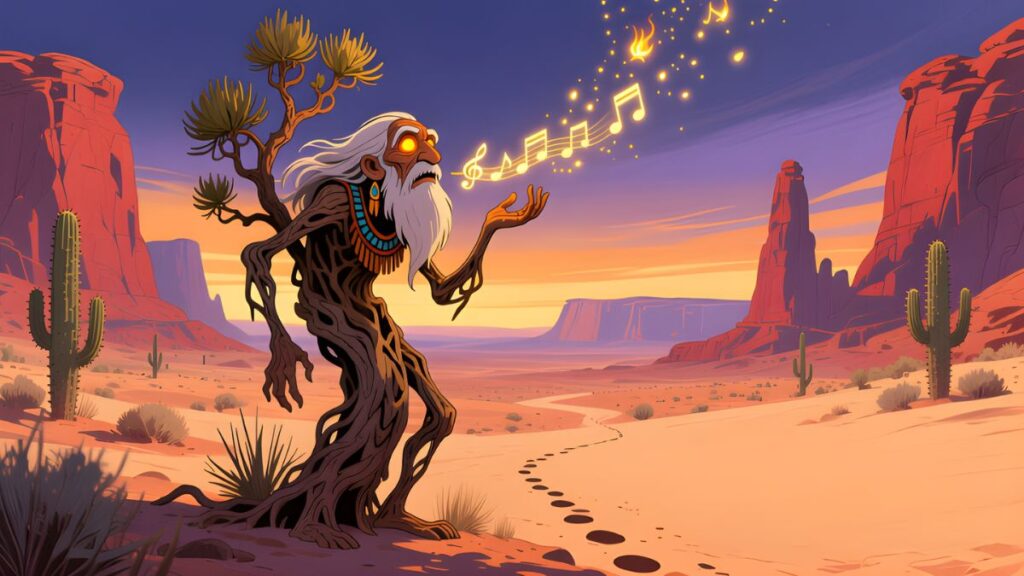
Mika loved the plains.
Wide. Open. Endless.
The wind always moved there.
It touched the grass.
It bent the trees.
It whispered across the earth.
Mika wandered alone.
He liked it that way.
No noise.
No crowds.
Just him.
And the land.
He knew every hill.
Every stone.
Every hidden stream.
He knew the smell of sagebrush.
The rustle of the grasses.
The pattern of the clouds.
He felt at home.
One morning, Mika left the village early.
The sun had barely risen.
Shadows stretched long across the plains.
Birds sang.
Wind blew softly.
He walked carefully.
Feet crunching on dry earth.
His eyes scanned the horizon.
Everything looked normal.
But he noticed the sagebrush.
It moved differently.
A soft rhythm.
Like a hum.
He paused.
He leaned closer.
The wind picked up.
The hum grew.
It seemed almost musical.
He tilted his head.
Could plants really sing?
He listened carefully.
The hum rose and fell.
Soft. Gentle. Constant.
He closed his eyes.
Memories came to him.
Stories from his grandmother.
Stories of ancestors walking the land.
Stories of animals, plants, and people living in harmony.
He imagined those who came before.
Hunters. Gatherers. Dreamers.
The sagebrush seemed to tell their stories.
Mika shivered.
Not from cold.
From awe.
He took a step forward.
The wind carried scents.
Earth. Sage. Pine. Water.
Each scent held meaning.
He remembered the lessons his grandmother taught.
“Listen to the land,” she said.
“Even when it is quiet.”
Now he understood.
The land was speaking.
Through the sagebrush.
Through the wind.
Through the rustling grasses.
He sat down among the bushes.
He let the wind flow around him.
He let the hum fill his ears.
He felt connected.
To the land.
To the past.
To those who had walked here before him.
Hours passed.
The sun climbed higher.
Shadows moved.
Birds flew overhead.
Mika stayed.
He listened.
He learned.
The wind told of storms.
Of survival.
Of courage.
Of patience.
Of kindness.
He realized the world teaches differently than books.
Books have words.
The land has life.
Movement. Sounds. Smells.
Lessons carried in subtle ways.
He touched the sagebrush.
It felt rough.
Alive.
Strong.
Soft in parts.
The hum seemed to flow through him.
He felt as if the land itself was guiding him.
He thought of his village.
Children playing.
People working.
Everyone busy.
Did they listen?
Did they notice?
He hoped they would.
The wind shifted.
A hawk called from above.
The hum of the sagebrush changed.
It became a gentle melody.
It seemed to tell a story of a family.
Hunters returning home.
The joy of children.
The care of elders.
Mika smiled.
He realized the stories were everywhere.
Even without words.
Even without writing.
The plains remembered.
The sagebrush remembered.
And now he remembered too.
He stayed until the sun was high.
Then he stood.
He looked around.
The plains stretched endlessly.
Birds soared.
Wind danced.
Sagebrush swayed.
He felt grateful.
For the lesson.
For the hum.
For the stories.
He walked home slowly.
Every step felt deliberate.
Every sound felt important.
Every scent mattered.
Back in the village, people noticed him.
He seemed different.
Quieter. Thoughtful.
He smiled.
He said little.
He did not need to.
The lesson would stay with him.
At night, he returned to the plains.
Moonlight washed over the grass.
Stars shone bright.
The sagebrush hummed softly.
He lay among the bushes.
Closed his eyes.
Listened.
Dreamed.
The wind carried stories through the night.
He imagined the ancestors.
Walking. Teaching. Living.
He realized listening was more than hearing.
It was noticing.
Feeling. Understanding.
The next morning, Mika returned again.
The plains looked familiar.
But somehow different.
The wind. The grasses. The birds.
Everything seemed alive in new ways.
He followed the hum.
It led him to a small hidden creek.
Water ran clear and cold.
Rocks were smooth.
The sagebrush bent toward the water.
It seemed to guide him.
He knelt.
Touched the water.
Felt the coolness.
He listened.
And learned.
The land teaches slowly.
It teaches carefully.
It teaches those who listen.
Mika realized he had found a teacher.
Not a person.
Not a book.
The plains themselves.
The wind.
The sagebrush.
He felt humility.
Gratitude.
Respect.
For the land.
For life.
For stories carried without words.
He walked back to the village.
Shared little.
But his heart was full.
The hum stayed with him.
The lesson stayed with him.
Years passed.
Mika grew.
He wandered the plains often.
He taught others to listen.
To notice.
To feel.
The sagebrush continued to hum.
Stories continued to flow.
Life continued.
The plains whispered.
And those who were willing to listen learned.
6. The Shadow of the Wolf
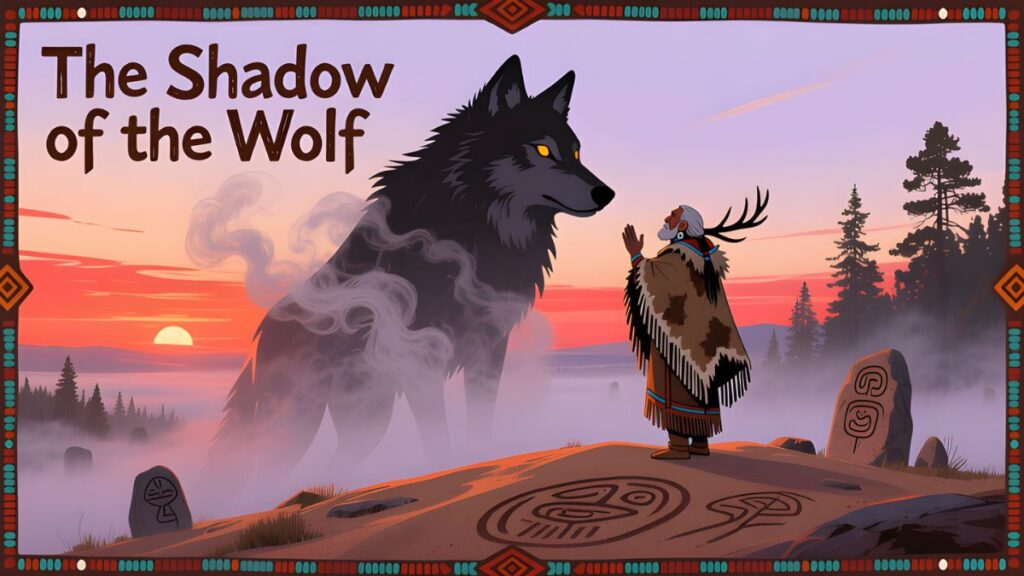
Tashi was shy.
Always had been.
She watched the world quietly.
She spoke softly.
Sometimes barely at all.
Her family worried.
Her friends teased gently.
But Tashi felt safest observing.
She loved the forest.
She loved the animals.
She loved the wind in the trees.
Most of all, she loved the wolves.
She watched them from a distance.
They were graceful.
Strong.
Independent.
Free.
She admired them silently.
One morning, the sun rose orange and gold.
Tashi walked to the edge of the woods.
She heard birds sing.
Leaves rustled.
A deer bounded across a clearing.
She crouched low.
Her heart raced.
She saw movement.
A lone wolf cub stepped into the clearing.
Small. Gray. Eyes bright.
It sniffed the ground.
It paused.
It glanced toward Tashi.
Then it turned.
Walked slowly into the woods.
Tashi hesitated.
Her heart pounded.
She had never followed a wolf before.
But something inside her said, “Go.”
She took a small step.
Then another.
Branches scratched her arms.
Twigs snapped underfoot.
She moved carefully.
The wolf cub paused.
It turned its head.
Tashi froze.
Then it darted ahead again.
She followed.
Her fear lingered.
But so did curiosity.
She remembered her grandmother’s words.
“Bravery begins with a single step,” she had said.
She swallowed.
And stepped forward.
The forest grew dense.
Light filtered through leaves.
Shadows danced on the ground.
Every sound was magnified.
A bird cried.
A branch fell.
Tashi paused.
Her hands trembled.
She wanted to turn back.
But the cub waited.
It looked back, inviting her to continue.
Tashi took another step.
And another.
Soon, she was running lightly.
The cub bounded ahead.
She laughed softly.
The forest no longer seemed frightening.
It seemed alive.
They reached a small clearing.
Sunlight streamed down.
Wildflowers swayed.
The cub stopped.
It sniffed the air.
It turned toward her.
Tashi knelt.
The cub approached cautiously.
It sniffed her hand.
Then it nudged her gently.
Her heart leapt.
She smiled.
For a moment, everything was perfect.
The forest, the sun, the cub.
Freedom.
She realized bravery was not absence of fear.
It was moving forward despite it.
They played together.
She ran.
It chased her.
She chased it.
They leapt over roots.
Dodged branches.
Jumped over rocks.
They tumbled softly on the mossy ground.
Tashi laughed more than ever.
She forgot her shyness.
Forgot her doubts.
The cub stopped suddenly.
Ears pricked.
It howled softly.
Tashi listened.
The sound echoed through the trees.
It was beautiful.
Powerful.
She felt a connection.
The cub circled her.
Then it ran into the trees again.
Tashi followed.
She realized she could do this.
She could face the unknown.
The forest no longer scared her.
She understood the rhythm of the land.
The cub paused at a stream.
Water ran over smooth stones.
It drank.
Tashi knelt nearby.
She touched the water.
Cool and refreshing.
The cub glanced at her.
She smiled.
It was a friendship forming.
Simple. Silent. Strong.
They continued through the woods.
The cub led her to hidden paths.
Secret glades.
Small clearings with flowers.
Little pools of water.
The forest whispered.
The wind carried stories.
Animals moved quietly around them.
She noticed tracks.
Other wolves.
Deer.
Birds.
Even tiny insects.
Everything mattered.
Everything was alive.
Tashi felt alive.
Bravery was a feeling.
A rhythm.
It was stepping forward.
Even when unsure.
Even when alone.
Hours passed.
The sun dipped low.
Shadows grew long.
Tashi realized she had wandered far.
She turned back.
The cub paused.
It seemed to say goodbye.
Tashi knelt and touched its head gently.
It licked her hand.
Then it darted back into the trees.
Tashi smiled.
She had faced fear.
She had followed curiosity.
She had discovered courage.
The journey back was quieter.
The forest seemed softer.
Gentler.
Friendly.
Her heart felt full.
She thought of the cub.
Of the wolf pack.
Of the lessons learned.
Bravery.
Trust.
Friendship.
The next day, she returned.
The cub appeared again.
They ran.
They played.
She laughed freely.
She told her family little.
She did not need to.
The forest had taught her well.
The cub had shown her the way.
And she would never forget.
7. The Painted River
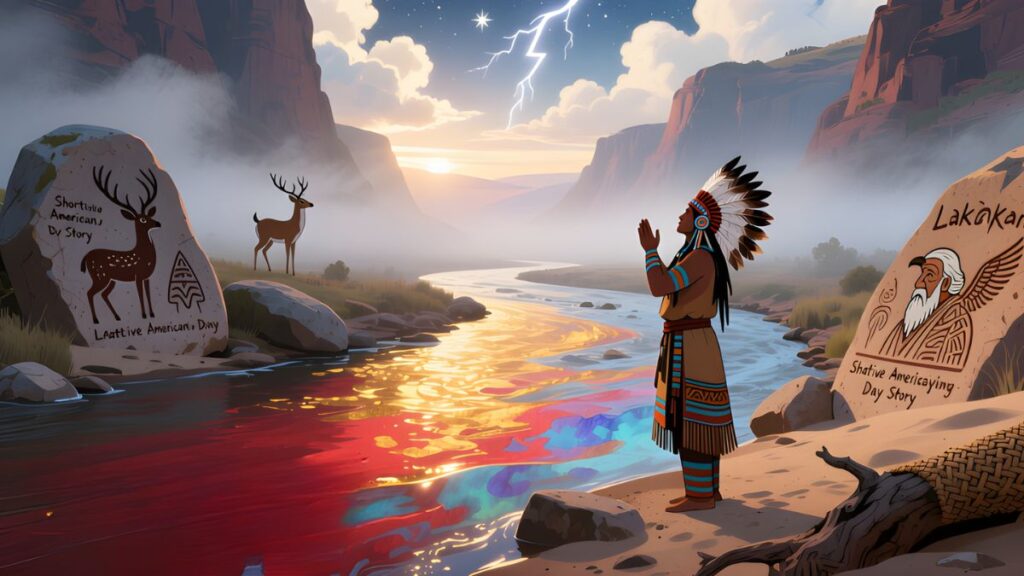
Eli loved the river.
It ran near the village.
Calm.
Flowing.
Alive.
After a storm, it looked different.
Water glittered in the sunlight.
Rocks were polished.
Branches lay scattered.
Clay was exposed along the banks.
The village buzzed with activity.
People repaired huts.
Fixed fences.
Cleaned debris.
Eli watched quietly.
He felt drawn to the river.
He knelt on the bank.
Touched the wet clay.
Soft.
Cool.
Malleable.
An idea formed in his mind.
He began to paint.
Small symbols.
Simple shapes.
Spirals.
Dots.
Lines.
He worked carefully.
Hands messy.
Clothes speckled with clay.
He painted stories.
Stories of the storm.
Stories of the animals.
Stories of the trees that bent but did not break.
Hours passed.
The sun moved across the sky.
His symbols glimmered in sunlight.
He stepped back.
Smiled.
It felt right.
The elders noticed.
They approached quietly.
No words at first.
They looked at the riverbank.
They nodded.
They smiled.
Eli felt proud.
He realized something important.
Storytelling is not just words.
It is symbols.
It is actions.
It is connections.
It can be painted.
Carved.
Shared with the land.
He continued his work.
Each symbol meant something.
A fish.
A deer.
A lightning bolt.
A tree bending in the wind.
He thought of the ancestors.
He wondered if they had painted symbols.
He imagined them along rivers.
Along cliffs.
Along the forest paths.
The river whispered softly.
Water lapped at the bank.
Wind moved the branches.
Birds chirped overhead.
Everything seemed alive.
Eli felt part of it all.
He added more symbols.
Some abstract.
Some literal.
Each carried meaning.
He paused.
Looked at the patterns.
Felt satisfaction.
The elders returned.
They nodded again.
One elder spoke softly.
“You understand, Eli,” she said.
He nodded.
“I do,” he replied.
She smiled.
The river seemed to shimmer more brightly.
As if acknowledging him.
Days passed.
Eli returned often.
He added more symbols.
Shared stories.
Sometimes alone.
Sometimes with friends.
Children gathered curiously.
Watched.
Learned.
He showed them how to shape clay.
How to choose symbols.
How to respect the land.
The river became a canvas.
A place of teaching.
A place of memory.
The villagers began to notice.
Not with words.
But with understanding.
The painted river became a silent storyteller.
Eli realized that art could hold history.
Could hold lessons.
Could carry messages across generations.
He remembered his grandmother.
She had told stories of ancestors.
Of symbols.
Of ways of remembering without words.
Eli felt connected.
To the land.
To the river.
To the people before him.
He learned patience.
Care.
Attention.
Every symbol mattered.
Every mark carried meaning.
The river flowed.
Eli’s markings remained.
The wind, sun, and rain altered them slowly.
But they persisted.
Like memories.
Like stories.
He realized the river taught him.
Stories are everywhere.
Not just in speech.
Not just in writing.
In actions.
In symbols.
In the earth itself.
The village embraced it.
Children learned from it.
Adults reflected silently.
Eli felt proud.
He felt fulfilled.
He knew he had learned something deep.
Something lasting.
Every day, he returned.
Each time adding new symbols.
Stories became longer.
Stories became richer.
The river and Eli were partners.
Partners in storytelling.
The elders sometimes walked along the banks.
They touched the clay lightly.
Smiled knowingly.
They remembered the past.
They honored the present.
They guided the future.
Eli understood the rhythm.
Painting. Telling. Listening.
The river shimmered in the moonlight.
Stars reflected on its surface.
He added small moon symbols.
Patterns of waves.
Marks of animals that visited at night.
The river glimmered as if alive.
It whispered in rhythm with the night wind.
Eli listened carefully.
Learned quietly.
The painted river was more than art.
It was history.
It was life.
It was a living storybook.
Years passed.
Eli grew.
The river remained.
Children learned to paint.
Elders guided.
Stories flowed silently.
The village thrived.
Eli continued to honor the river.
The clay, water, and symbols became his lifelong companions.
Through it, he understood the power of storytelling.
Not just words.
Not just tales.
But connection.
To land.
To ancestors.
To the world.
Every mark mattered.
Every symbol spoke.
Eli smiled.
The river told its stories.
And he listened.
And he painted.
And he learned.
Why I Thought I Could Handle It
In my defense, and let’s be real, it is a weak defense, I have always thought of myself as a “quick learner.” Give me a skill, give me enthusiasm, and I will figure it out. That is how I approach yoga. That is how I approach cooking. That is…okay, that is also how I approach disastrous attempts at pottery.
So why not storytelling? Short Native American Day Stories could not possibly be that hard. They are short, right? Easy. A story a kid could read in five minutes.
Ha. Ha. Ha.
The universe has a funny way of humbling you. Within five minutes, I realized that not only do I not know the subtle differences between tribes, regions, or storytelling traditions, I don’t even fully understand what makes a story authentic. That is when I first tasted the bitter flavor of eating crow.
Reading vs. Understanding
Here is the thing. Reading about a culture is not the same as understanding it. I had piles of notes, links, PDFs, and two different e-books that claimed to give me “Native American wisdom in bite-sized stories.” I read. I highlighted. I nodded like I was absorbing it. But then I tried to write about it, and nothing.
It is like trying to build IKEA furniture without reading the instructions. You see the pieces. You think you know where they go. And then suddenly you are holding the shelf upside down, screws rolling across the floor, and your cat is judging you.
I had every intention of being respectful, but my “short stories” came out more like a confused tourist’s diary entry than a meaningful reflection.
The Fear of Getting It Wrong
Have you ever wanted to do something meaningful and just failed spectacularly? Felt that pit in your stomach, that Oh no, everyone is going to know I am clueless sensation? That was me.
It is scary. Because even though this was just a personal project, I suddenly realized getting this wrong might feel like disrespect. And I did not want to disrespect anything. But I also did not want to sit on the sidelines and do nothing.
So I pushed forward anyway, my fingers hovering over the keyboard, heart pounding. The moment I tried to summarize a story without fully grasping its context, I knew I was in trouble. Epic fail.
How I Learned to Laugh at Myself
After a few hours, several drafts, and one full-on meltdown, I had to stop. I leaned back, closed the laptop, and admitted I was in over my head. Big time.
That is when I laughed. Because what else can you do when you have accidentally turned a day meant for reflection into a self-inflicted chaos fest? Laughter was the only option. And also, yes, eating crow.
I realized I was approaching this the wrong way. I did not need to be an expert. I did not need to condense centuries of culture into five-minute reads. I needed to experience it in a way that was genuine, reflective, and most importantly, humble.
The Pivot: Appreciation Without Pretension
Here is the lesson I did not expect. Sometimes the best way to engage with a culture is not by trying to summarize it or simplify it. Sometimes it is just showing up with curiosity, respect, and openness.
For me, that meant reading the materials slowly, taking notes not to create my own stories but to understand the themes—community, resilience, connection to nature, respect for elders. It meant acknowledging when I did not know something and resisting the urge to fake it. It meant letting the stories speak for themselves, instead of me trying to put them into my own clumsy words.
And you know what? That is when the experience started to feel meaningful.
Questions I Did Not Know I Needed to Ask
As I reflected on my epic fail, a question popped into my mind. Why am I so afraid of failing at understanding something bigger than myself?
Seriously, think about it. Why do we sometimes run headfirst into things we do not understand, just to prove something to ourselves? Why does the fear of failure make us act like we know more than we do?
I realized I was not afraid of learning. I was afraid of looking stupid. And you know what? That fear is a trap. Because when you let it control you, you stop engaging, stop experimenting, stop really connecting with the world.
I had to let go of that fear, embrace the embarrassment, and admit that some things are bigger than me. Some stories are bigger than me. And that is okay.
The Real Takeaways
So after my disaster of a Native American Day project, here is what I learned
- Curiosity is better than perfection. You do not have to summarize every story or understand every custom. Just show up. Read. Reflect. Appreciate.
- Humility beats ego. My ego wanted to write a “perfect” short story. My humility reminded me I am not in charge of centuries of culture.
- Epic fails are necessary. If you never embarrass yourself, are you even trying? Spoiler: yes, that includes eating metaphorical crow.
- Respect is active. It is not just about reading or listening. It is about checking your assumptions, acknowledging gaps in your knowledge, and approaching with care.
- Reflection matters. It is one thing to consume stories. It is another to think about how they connect to your life, your values, and your understanding of humanity.
Okay, So What is the Actual Point?
The point is not to make a fool of yourself—though that might happen. The point is to engage thoughtfully. To understand that “short stories” are not just simple narratives—they are vessels of wisdom, culture, and identity.
I learned that trying to shortcut that experience with a quick summary does not honor the stories or the people behind them. What does honor them is slowing down, listening, and appreciating the depth without pretending you have mastered it all.
How I Approach Short Native American Day Stories Now
Nowadays, when Native American Day comes around, I do things differently
- I read, I reflect, I listen. No summaries, no clumsy rewrites.
- I share learnings, not interpretations. I might talk about themes, insights, or questions that arose, but I leave the storytelling to those who know it best.
- I honor the diversity. I remind myself that each tribe, each story, has its own context. One-size-fits-all summaries do more harm than good.
- I embrace my failures. And yes, I still sometimes eat crow—but now with a side of humor.
The Surprise Joy of Failure
Here is the thing about my epic fail. It turned into one of the most educational experiences of my life. I could have quit after feeling embarrassed, but instead, I leaned in. And leaning in meant recognizing my mistakes, learning from them, and growing.
Failure, as humiliating as it feels, is a powerful teacher. And sometimes, it is downright hilarious. Because let us face it, when you sit down to write “Short Native American Day Stories” and end up spiraling into confusion, you have to laugh.
And laughing makes space for humility. And humility makes space for real understanding. And real understanding, well, that is the kind of connection that lasts.
Final Thoughts
So, my takeaway for anyone looking to engage with short Native American Day stories, or really any culture, is simple
Show up. Be curious. Do not pretend you know more than you do. Embrace your failures. Laugh at yourself. Reflect. Repeat.
The next time I attempt something ambitious, I might still screw it up. I might still end up eating crow. But now, I know that failure is not the opposite of learning—it is learning. And in a way, that is the most authentic story I can tell.
So tell me. Have you ever tried something you thought would be “easy” and ended up completely failing? Felt that pit in your stomach, that embarrassment? Yeah, me too. Let us just laugh about it together.
Because life, like storytelling, is messy, unpredictable, and full of lessons, if you can survive your own epic fails, that is.


